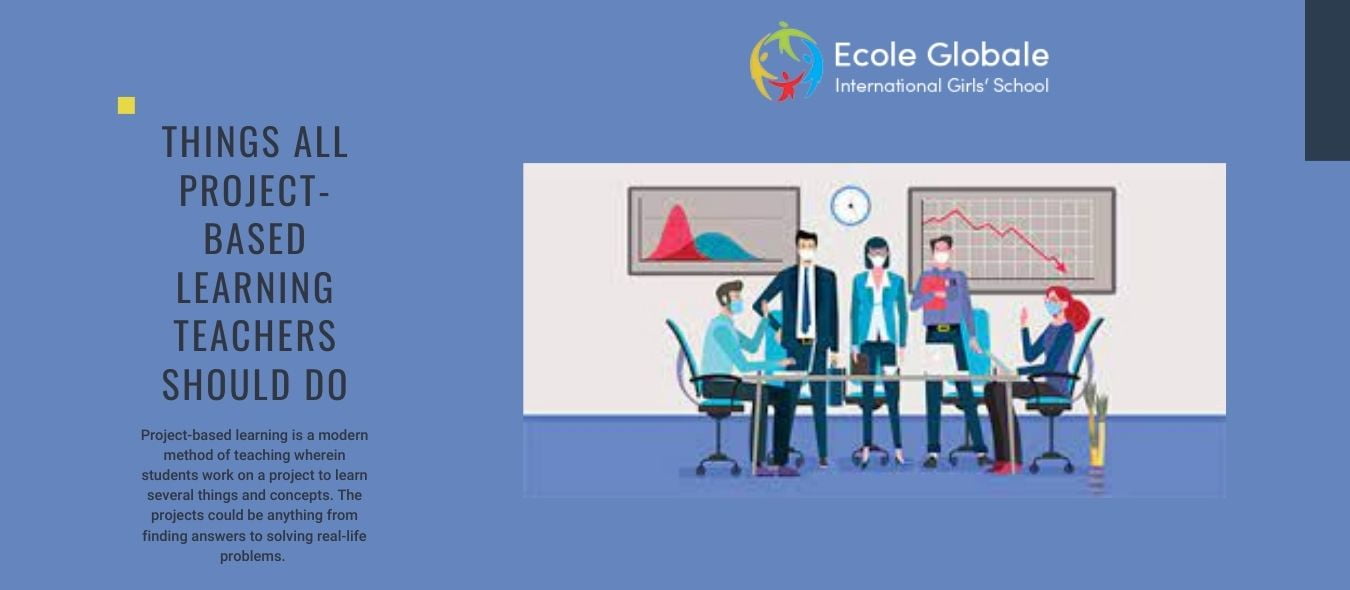Project-based learning is a modern method of teaching wherein students work on a project to learn several things and concepts. The projects could be anything from finding answers to solving real-life problems. In the end, along with deeper knowledge about the topic, the students also acquire various skills that are involved in completing the project.
Project-based learning (PBL) puts enough on each child’s existing skills and capabilities that might have scope for nourishing. Identifying personal skills is an extremely important aspect of life.
PBL has been proved to be a very effective form of learning in which students gain knowledge through experience and develop certain skills through working and managing everything.
Some of the skills that are generally developed through project-based learning are:
- Teamwork – students slowly learn to work in a team and coordinate with others to make the project successful.
2. Critical thinking – to solve a problem or find answers, the students shift to critical thinking, thereby developing the vital skill.
3.Creativity – with no intervention of an outsider, the team member’s only goal is to complete the project. This will make them look for creative ideas and hence, maintain an innovative environment among themselves.
4.Communication – with team building, the students develop another essential skill. Communication is the key to success, and students learn it on their own by working on a project for an extended amount of time to make it successful.
So these are some of the common skills that the students can develop through project-based learning. Further, more such skills are learned by the students based on the type of project they’re working on.
Now let’s see what the teachers can do to implement and make PBL more effective.
- Plan – teachers are required to work a little in planning the project. The ultimate planning involves identifying what the students will learn out of their projects at the end. Identifying the learning aspect will enable you to build and customize the project for each student group appropriately.
You can further set specific tasks and goals to be achieved within the project that’ll teach them certain topics that you want them to learn. For instance, setting a task of minimizing the cost of marketing in a project of formulating a marketing plan will teach your students about the efficient use of resources and the art of negotiation as well.
In the end, while presenting the project, your students will describe what they learned through working on the project that was ultimately planned by you.
- Initiate thinking – the most powerful tool of the current era, social media, is an art of thinking. Professional thinking and a broad mindset have brought the revolution of progressive ideas over digital platforms. It tells us about the importance of one’s thinking ability. We, humans, have the ability to distinguish right and wrong by thinking.
As a teacher, you must initiate the art of thinking through different perspectives by assigning them such kinds of projects. PBL will make them think and find answers on their own to develop the immensely required skill of today’s era.
- Flexible but organized – PBL is all about flexibility in learning. But there should be a hint of organization for available resources and potential inputs. Flexibility is naturally created where students are working on a project with creativity. So it would be best if you taught them about organizing the project well and in a manner that doesn’t seem to be a burden.
You can make this a mini-task for all the project groups to manage their team resources in the best possible way and thereby, win a separate category of award for organization skill.
Real-life problem – project-based learning usually involves a real-life scenario of a problem to be solved. This is because the real-life problems will expose the students to the actual difficulties that are faced in the world. Further, they’ll learn to deal with them and, at the same time, develop various skills. What kind of skills they can develop through working on real-life problems are explained above. So this becomes essential to assign projects to your students that highly relate to the current affairs or scenario of the world or perhaps a certain industry.
In the end, you as a teacher must coach your students to learn concepts from the project they’ve worked on. It is not necessary that the students will naturally lead in the direction you’ve planned for. So at that time, you can guide them and make them learn what lies at the end of the project. For this, you must be a knowledgeable person to your students rather than a strict teacher of the traditional form.









